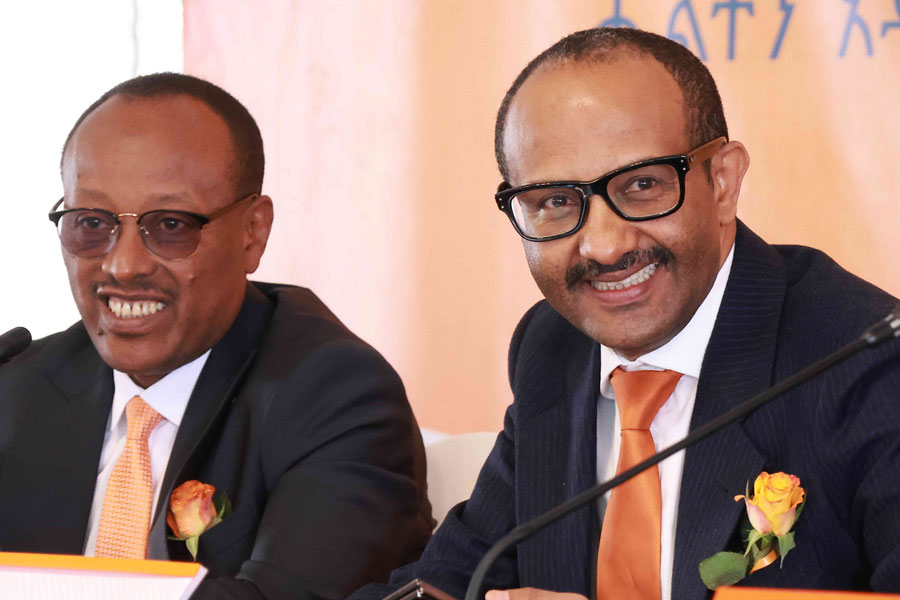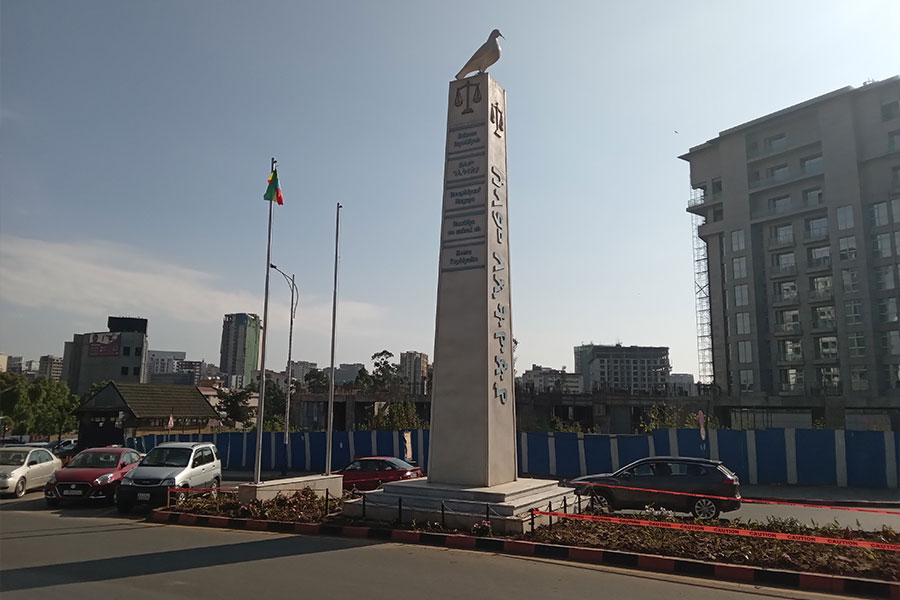
News Analysis | Jan 19,2024
Jul 2 , 2022.
After nearly two years since the civil war broke out in northern Ethiopia, adversaries in this regrettably brutal conflict appear to have realised that there neither is victorious nor the vanquished. Now the most arduous journey in making peace is on the horizon. Ideally.
"We want to give peace a chance," said Gideon Timothous (PhD), a minister of Justice, speaking after the executive committee meeting of the Prosperity Party (PP) last week.
He betrayed no emotions as he outlined some of the terms for the potential peace talks and why the ruling party's central and executive committees believed negotiations over conflict were the preferred way forward. This comes at a backdrop of murmurs that developments towards negotiated settlements were in the offing. Prime Minister Abiy Ahmed (PhD) appeared before Parliament, responding to sceptical, if suspicious voices, over the prospect of direct talks between delegates of the federal government and the TPLF, in control of the Tigray Regional State. It was not wholly unexpected that the formalities would soon begin.
However, Gideon's is the first unambiguously official pronouncement by the ruling party to resolve the militarized conflict in Tigray through a negotiated settlement. It should be a welcome recognition by Addis Abeba that the conflict is political and thus better resolved through a political process. Gideon is one of the seven negotiators the federal government formed, led by Demeke Mekonnen, deputy prime minister, who is also minister of Foreign Affairs.
The prospect of peace talks has yet to receive as much proactive attention as the war had. The frustratingly slow process leading to peace has many spoilers and no less number of sceptics about its success. It is demanding to trust declarations of peace from political leaders who have failed to provide it for so long. Few are under the impression that negotiations to end the civil war and the much-hyped "national dialogue" could inaugurate negotiated settlements and eventually peace. Several have grown cynical that the state of affairs would improve anytime soon, short of a miracle.
Despite the apparent reluctance to believe in the possibilities of peace, recent gestures are evident that both sides accept peace comes from the recognition of managing conflicts through talks. But Kissingerians believe "peace comes over a long period, from a series of steps, and not from a grand settlement." As a stalwart of shuttle diplomacy to bring peace between Isreal and Egypt during the 1970s, Henry Kissinger's words of wisdom are relevant for today's Ethiopia.
"What kind of peace do we seek," asked John F. Kennedy, delivering a commencement speech at the American University in Washington, on his way to Berlin, in 1963. "To focus on the practical and attainable rather than the grand, or the search for a magic formula. Genuine peace must be . . . the sum of many acts."
The first in a series of acts in the journey for peace has undoubtedly begun. The direct talks are expected to take place in Nairobi under the auspices of the African Union's emissary, Olusegun Obasanjo, if the wishes of Addis Abeba have their way. Mekelle is not keen about AU's Envoy seeing him and the AU as partisans; it desires the mediation of the Kenyan government, backed by the United States.
The most significant hurdle in the long march to peace is the trust deficit. A case of prisoners' dilemma, a game theory example that expresses why individuals are incentivised not to cooperate in a given situation, is at play here. The rationale assumes that the cost of being “betrayed” is theoretically higher. While not mutually beneficial, doing the betraying offers the chance of individual survival. The hard part for mediators will be convincing the parties to the conflict that what is the ideal outcome for mutual wellbeing is also in the best interest of either side. It will be a tough task given the warring sides' crippling feelings of collective insecurities.
Accounting for the costs of the civil war can help both sides identify the benefits of walking the path of peace more clearly. The depth of horror unleashed has been unimaginable, even by the few who saw the war coming. Hundreds of thousands have perished, including women and children. Massacres have been widespread, women raped, and children orphaned. Human development outcomes that have taken decades to achieve have been wiped out within months. Hopes of economic development dragged through the mud. No one has had anything positive to show for the war except the warmonger class that grew in influence and power.
The alliance for war has been emboldened in the two years since the conflict started. It is time for the coalition of peace to seize the moment to push for peace talks, negotiations and settlements.
Undoubtedly, months will be spent going back and forth over formalities and procedures. Agreeing on the very agendas for talks, the selection of mediators, the venue where the talks will be held, and the preconditions put forth even to start talking about substantive issues will drag on the process for a seeming eternity. Delegates may threaten to walk out or indeed do so. Talks may collapse, only to resume after brief or extended interruptions. These are all expected ups and downs of peace talks.
The first order of business should be to leverage the "humanitarian truce" Addis Abeba declared. The current default cessation of hostilities from active battles should be pushed to an agreed ceasefire. If the planned talk in Nairobi achieves this, it will be vital in the many steps to follow in putting the building blocks for enduring peace.
Meanwhile, some measures can be taken in good faith by both sides. Recognition of each other as legitimate expressions of grievances and interests would be crucial. In its absence, no meaningful talks can go forward. A population is under siege, deprived of essential services and limits put on humanitarian provisions. Allowing unfettered access to humanitarian aid in food and medicine and the resumption of all public services to the population in Tigray can show the federal government's determination to start the peace talk in good faith. Doing so is also a matter of moral obligation.
Moving onto substantive issues, Gideon emphasised his government’s parameters to negotiate within the framework of the constitution and uphold the constitutional order.
On the surface, here is where it appears the federal government can see eye to eye with the TPLF leaders. For either side, rejecting the constitution may repudiate their respective legitimacy. For Mekelle, its claim over the Western part of Tigray, now under control by forces of the Amhara Regional State and until recently by Eritrean troops, can only depend on the acceptance of the constitution and its order. The Achill's Hill for the TPLF will be to accept the same constitution that does not allow the existence of a national army that is more than one. It guarantees regional states to organize militia forces armed with no sophisticated rifles. The disarmament of a highly mechanized army under their command and the legitimate right of the national army to be deployed anywhere within the federation's sovereign territory will demand a tough compromise.
Addis Abeba will have to concede that the existing constitution has the disputed territories under the Tigray Regional State. To see through the departure of armed forces from the Amhara Regional State and the complete withdrawal of Eritrean troops from these and other areas in the north is its obligation to fulfil. It no doubt will be a tough sell for mediators to persuade Mekelle that the national army can be deployed in Western Tigray following the departure and withdrawal of other forces.
These and many others will be contentious issues ahead. However, it takes a village to make peace work. Even the best possible outcome towards peace, if done without transparency, can crumble in a sea of suspicion, conspiracy theories and mutual mistrust. If there is a commitment to peace, the parties to the conflict need to realise that they now stand united against the war camp, vocal and noisy in both camps. The best way to make a negotiated settlement work is by communicating to the public why it is in everyone’s best interest and getting buy-in. The vultures circling in the sky will swoop in to feed public suspicion with hate and bigotry to perpetuate the war.
Negotiations would be a process, not a one-time exercise when things go sideways. It must be an ongoing process, however full of setbacks and frustration.
Words of wisdom from Basil Liddel Hart, the British military theorist and historian: "Keep cool. Have unlimited patience. Never corner an opponent, and always assist him to save his face. Put yourself in his shoes . . . Avoid self-righteousness like the devil - nothing is so self-blinding."
PUBLISHED ON
Jul 02,2022 [ VOL
23 , NO
1157]

News Analysis | Jan 19,2024

My Opinion | Mar 06,2021

Photo Gallery | May 06,2019

Editorial | Sep 17,2022

Sunday with Eden | Jun 11,2022

Viewpoints | Sep 28,2024

Letter To Editor | Jan 26,2019

Fortune News | Jan 19,2024

Viewpoints | Mar 26,2022

In-Picture | Sep 29,2024

Photo Gallery | 174023 Views | May 06,2019

Photo Gallery | 164248 Views | Apr 26,2019

Photo Gallery | 154349 Views | Oct 06,2021

My Opinion | 136611 Views | Aug 14,2021

Dec 22 , 2024 . By TIZITA SHEWAFERAW
Charged with transforming colossal state-owned enterprises into modern and competitiv...

Aug 18 , 2024 . By AKSAH ITALO
Although predictable Yonas Zerihun's job in the ride-hailing service is not immune to...

Jul 28 , 2024 . By TIZITA SHEWAFERAW
Unhabitual, perhaps too many, Samuel Gebreyohannes, 38, used to occasionally enjoy a couple of beers at breakfast. However, he recently swit...

Jul 13 , 2024 . By AKSAH ITALO
Investors who rely on tractors, trucks, and field vehicles for commuting, transporting commodities, and f...

Oct 12 , 2025
Tomato prices in Addis Abeba have surged to unprecedented levels, with retail stands charging between 85 Br and 140 Br a kilo, nearly triple...

Oct 12 , 2025 . By BEZAWIT HULUAGER
A sweeping change in the vehicle licensing system has tilted the scales in favour of electric vehicle (EV...

Oct 12 , 2025 . By NAHOM AYELE
A simmering dispute between the legal profession and the federal government is nearing a breaking point,...

Oct 12 , 2025 . By NAHOM AYELE
A violent storm that ripped through the flower belt of Bishoftu (Debreziet), 45Km east of the capital, in...